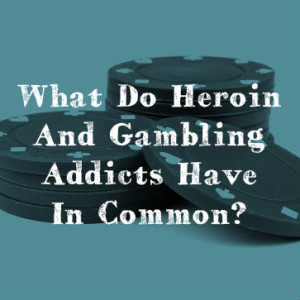Do Heroin And Gambling Addicts Share Similar Brain Changes?
Substance addiction, which stems from the improper use of drugs or alcohol, is the classic model of physical addiction. It contrasts with behavioral addiction, a newly acknowledged form of addiction not centered on substance use. In a study published in January 2014 in the journal Drug and Alcohol Dependence, researchers from the U.S. and China compared the brain effects of one particular form of substance addiction—heroin addiction—to the brain effects of gambling disorder, the only officially recognized form of behavioral addiction in the U.S. These researchers concluded that the two conditions produce differing but overlapping brain changes.
Substance Use Disorders
Substance addiction is one of the two major components of an officially diagnosable condition called substance use disorder (which also includes serious, non-addicted substance abuse). People affected by this form of addiction experience long-term changes in their brains’ chemical status brought about by the repeated use of excessive amounts of alcohol or any one of a range of drugs or medications.
These changes occur because the brain receives enough exposure to alcohol, drugs or addictive medications to begin treating this exposure as the norm rather than the exception.
Symptoms Of Substance Addiction
 Strong and recurring urge to drink or use drugs
Strong and recurring urge to drink or use drugs- Corresponding inability to voluntarily limit substance intake
- Increasing tolerance to the effects of drugs or alcoho
- Withdrawal symptoms when the “normal” amount of alcohol or drugs is unavailable
- Destructive pattern of behavior focused primarily on substance use
Similarities Between Substance Addiction And Behavioral Addiction
Behavioral addiction produces a series of changes that mirror many key aspects of substance addiction. However, instead of stemming from excessive drug or alcohol intake, this form of addiction stems from excessive reliance on (or participation in) a specific activity.
- Strong and recurring urge to participate in a given behavior
- Inability to voluntarily limit that behavior
- Establishment of a destructive pattern of conduct focused on the behavior in question
Like substance addiction, behavioral addiction also creates long-term changes in the way the brain does its job. The American Psychiatric Association includes both substance addiction and behavioral addiction in a large grouping of conditions known collectively as substance-related and addictive disorders. There are a number of officially recognized substance-related disorders; however, as of 2014, gambling disorder (problem gambling, compulsive gambling, pathological gambling) is the only recognized form of addictive disorder.
Comparing The Brain Effects On Heroin Addiction Vs. Gambling Disorders
In the study published in Drug and Alcohol Dependence, researchers from the University of Southern California, the Chinese Academy of Sciences and China’s Guiyang Medical University conducted testing designed to compare the brain impairment of heroin addiction to the brain impairment of gambling disorder (identified in the study as pathological gambling).
Participants in this testing included 58 heroin addicts maintaining abstinence from drug use, 60 people diagnosed with gambling disorder and 60 generally healthy people unaffected by either heroin addiction or gambling disorder. Each of these participants took part in a test that assesses a critical form of short-term memory called working memory, as well as a separate test that assesses the ability to make decisions and control impulsive behaviors. The researchers compared the testing results of both the heroin addicts and the compulsive gamblers to the testing results of the healthy study participants.
They concluded that, compared to healthy people, heroin addicts experience a significant decline in their ability to use working memory, make decisions and control their actions. People affected by gambling disorder also experience problems making decisions and controlling their behaviors; however, they do not experience problems with their working memory. In addition, the researchers found that the brain impairments associated with heroin addiction grow worse over time. In contrast, the brain impairments associated with gambling disorder do not appear to grow worse or have a greater impact on people heavily addicted to gambling.
Behavioral Actions And Memory Problem Differences In Addiction
Based on their findings, the authors of the study published in Drug and Alcohol Dependence concluded that decision-making and impulse control problems appear to be central features of addiction, whether that addiction stems from a substance or a behavior. Memory problems, on the other hand, appear to be specific to substance addiction (or, at the least, heroin addiction). Further research will be needed to determine if other forms of behavioral addiction not officially recognized in the U.S. (such as sex addiction and Internet addiction) produce the same changes in brain function as gambling disorder.
Read More About The Importance Of Identifying Signs Of Substance Abuse In Bipolar Patients



